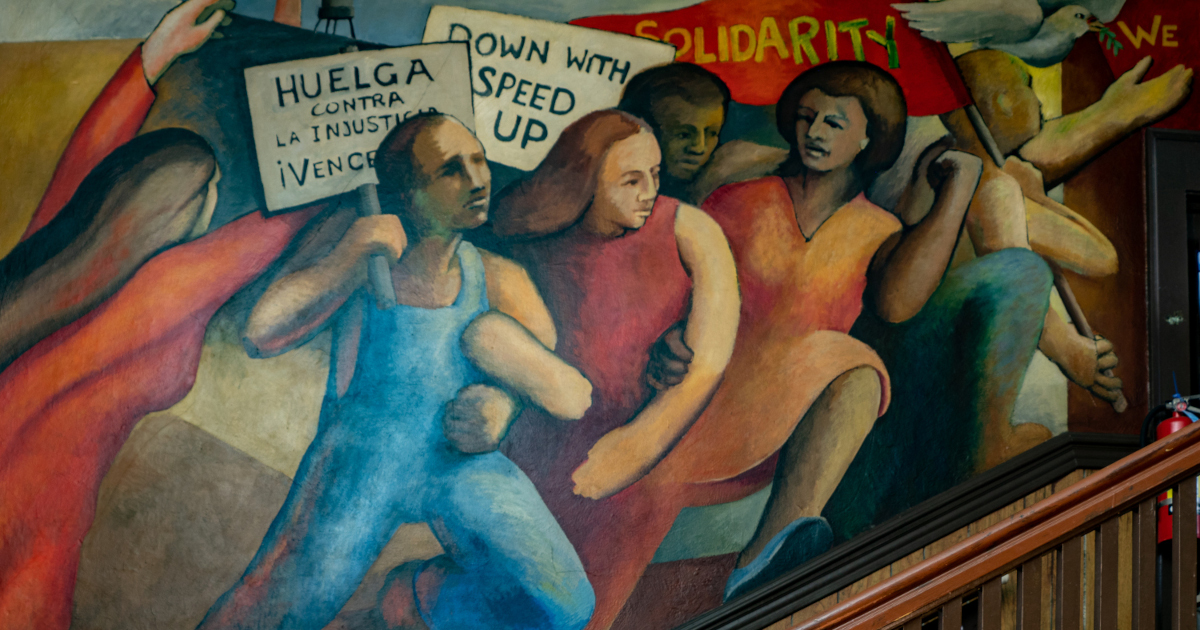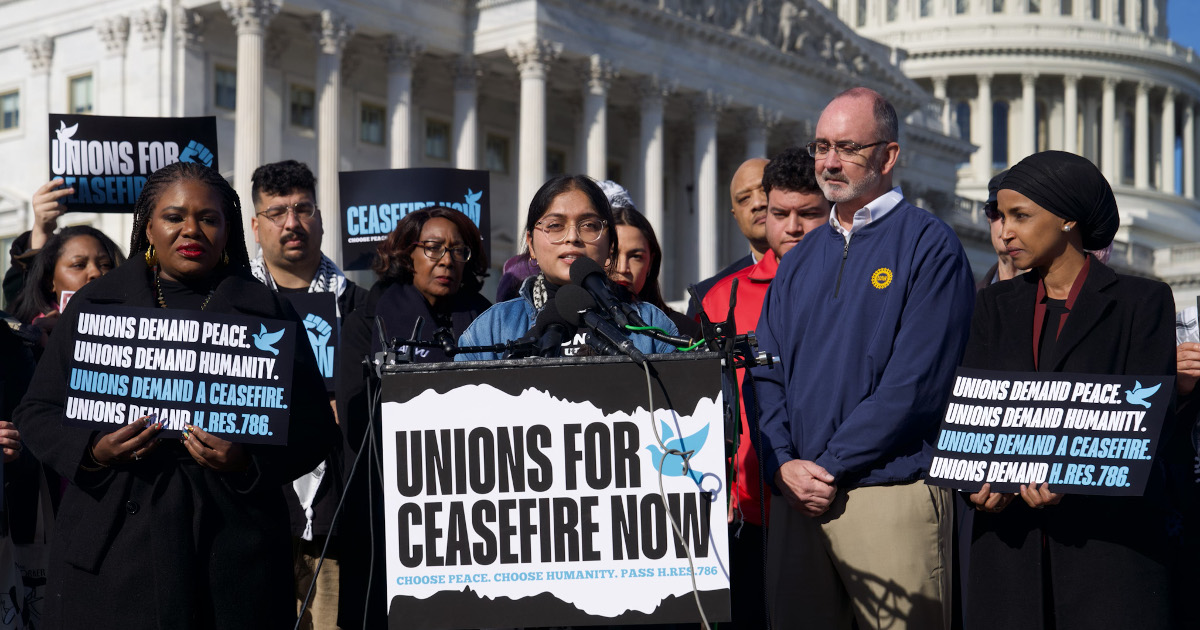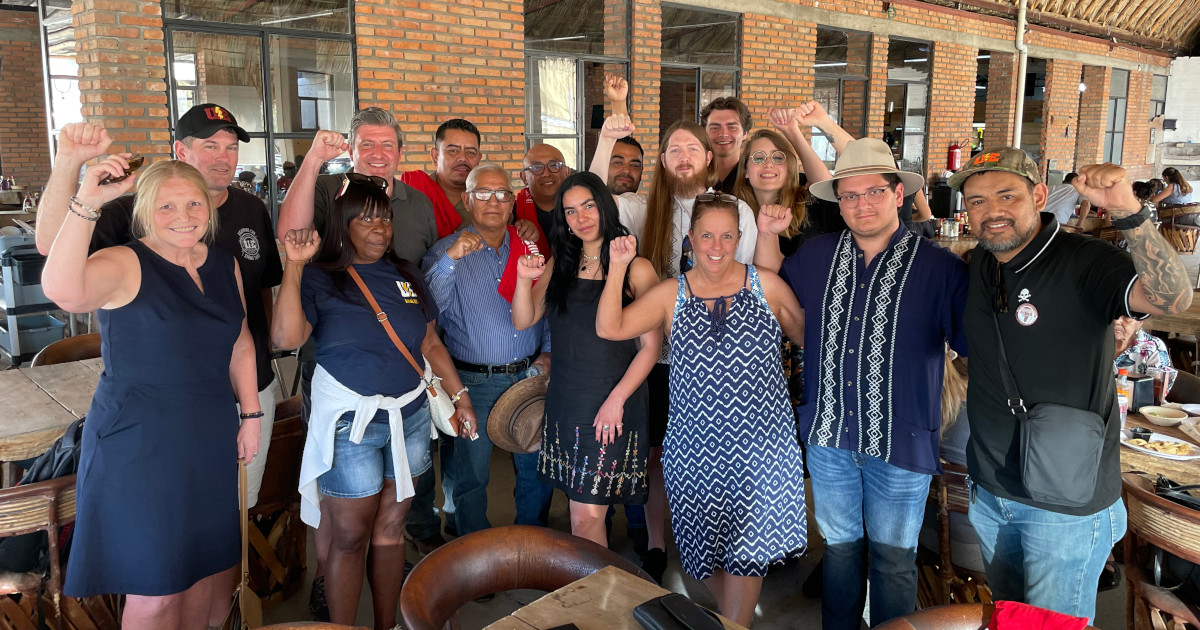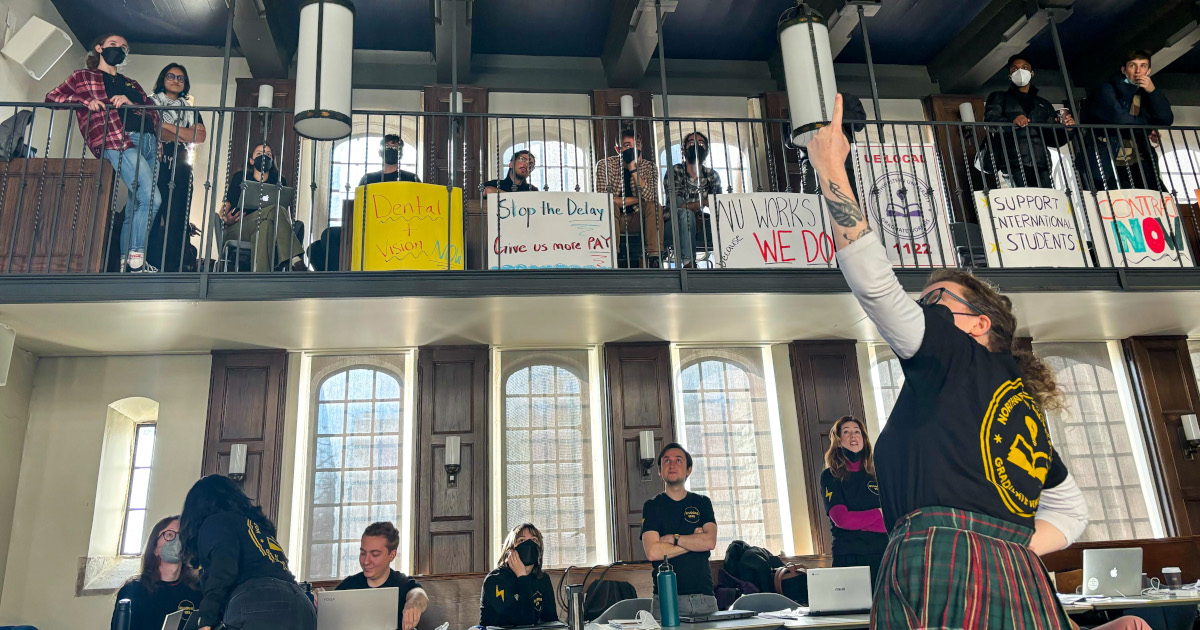The last five days on social media, we’ve been counting down the top five UE NEWS stories of 2024. Here they are:
#5 ‘Solidarity’ Mural Saved

Photo: J Burger.
Fifty years ago, a team of artists led by John Pitman Weber and Jose Guerrero created the “Solidarity” mural on the interior walls of the UE Hall in Chicago, in what was at that time the center of a vibrant working-class neighborhood. When UE sold the building earlier this year, the mural was in danger of being lost.
Working with the Chicago Public Art Group (CPAG) and thousands of individual supporters, UE secured enough funding to remove the most important parts of the mural from the hall prior to new owners taking over the building in March.
The mural tells the story of UE, industrial unionism, and related social movements in the style of Diego Rivera. For 50 years, it has served as a visual narrative of the struggles and triumphs of the working class, capturing the spirit of solidarity, resilience, and the fight for workers’ rights.
In the fall, CPAG was awarded a $450,000 grant from the Andrew W. Mellon Foundation that will allow preservation experts Parma Conservation, who removed the mural section by section, to complete the process of restoring and relocating the mural. The work is expected to be completed at the end of 2025. The mural will be relocated to the new UE Chicago offices at the home of the Chicago Teachers Union. Smaller sections of the mural will be displayed at the UE Local 506 hall in Erie, Pennsylvania, and at the offices of a pro-labor magazine in Chicago, In These Times.
#4 Labor Network for Ceasefire

UE at Unions for Ceasefire press conference.
In February of 2024, UE and six other national unions launched The National Labor Network for Ceasefire (NLNC) to advocate for a ceasefire in Gaza. This coalition, which also includes over 200 local unions, represents over nine million union members, more than half the U.S. labor movement. It is notable for being the first time such a large section of the U.S. labor movement has spoken up in opposition to U.S. foreign policy under a Democratic president.
Shortly after its launch, the NLNC hosted a webinar on February 22 featuring union leaders and congressional representatives. UAW President Shawn Fain underscored the labor movement’s moral responsibility to act, while Representative Rashida Tlaib highlighted the connection between bloated military budgets and unmet domestic needs.
Over the past year, UE members have played an active role in supporting the ceasefire movement, participating in protests in Washington, DC and rallies in Pittsburgh, Los Angeles, and New York City. Local 150 in Durham linked their demand for a ceasefire with economic justice for local city workers, pointing out that funds used to support foreign military aid could instead raise wages and improve conditions for workers in their own communities. Local 667 in Pittsburgh has launched a campaign to apply the Boycott, Divest, and Sanctions (BDS) movement to their own workplace, collecting signatures on a petition to remove Israeli products from the co-op grocery store where they work.
UE locals also played an important role in protests held on university campuses around the country, and took the lead in organizing a statement in solidarity with campus protests defending the free speech rights of students and academic workers. The statement was signed by unions representing over a million faculty and other academic workers across the United States.
#3 Investing in Leadership Development

UE delegation in Mexico with FAT members.
In April, UE launched the first UE Women’s Leadership Program, designed to build the leadership of women and gender non-conforming members of the union. The program began with an in-person meeting at the Labor Notes conference in April, and continued with virtual meetings for six months. “I think it’s a great program,” said participant Janet Gray, Local 618. “I’m hoping that it can be continued.”
The Women’s Leadership Development program follows on the heels of the Leadership and Staff Development Program, which was initiated in 2022 to build the leadership of workers from racial and ethnic backgrounds underrepresented in UE leadership and staff. The second cohort of the LSDP graduated in February.
Both Women’s Leadership Program participants and LSDP graduates were among the over 100 UE members who attended the Labor Notes conference in Chicago. Members of UE’s largest-ever delegation both led and learned from a rich variety of workshops, panels, and gatherings at this 5,000-person conference designed to grow the “trouble-making” wing of the labor movement.
Several Women’s Leadership Program participants also joined UE’s first worker-to-worker exchange with Mexican allies the FAT since before the pandemic. They were part of a delegation of eight rank-and-file UE members from locals across the country who traveled to Mexico in May to share experiences with their counterparts south of the border and build international solidarity.
And in November and December, UE held the third edition of the Building Union Power program. First held in 2022, Building Union Power is a four-week online workshop series to help local leaders learn how to use campaigns in the shop to develop new leaders and strengthen their local unions.
#2 UE Locals Still Winning Record Wage Gains

Durham City Workers Union/UE Local 150 members rally for fair pay.
UE members achieved significant economic progress in 2024 by securing substantial wage increases both through collective bargaining, and, in the public sector in North Carolina where collective bargaining is prohibited, through successful city budget campaigns.
Local 319 at Battenfeld Grease and Oil Corporation set a high standard, winning wage increases of up to 22 percent over three years, reflecting their efforts to incentivize skilled labor and secure long-term opportunities. Similarly, Local 1186 at Willy Street Co-op addressed systemic inequities by introducing seniority-based pay raises and inflation-matching wage adjustments, ensuring fair compensation across all demographics.
In Burlington, Vermont, Local 203 members at City Market achieved $2 hourly raises and additional pay grade improvements, emphasizing higher wages to combat worker turnover. Local 667 in Pittsburgh made similar strides, immediately raising the minimum rate from $15 to $18.45/hour and ensuring equity in pay progression. Meanwhile, Local 704 in Cincinnati negotiated a historic 7.5 percent wage increase, complemented by new safety policies and sick leave.
Although North Carolina law prohibits collective bargaining in the public sector, Local 150 members who work for the cities of Durham and Charlotte, North Carolina won the largest wage increases they have seen in years by pressuring their city council to improve city workers’ page in their annual budgets.
Several locals, including two Local 222 Sublocals in Connecticut tackled pay disparities in creative ways. Sub-Local 39 realigned wages with town standards, offering raises between 4 and 11.9 percent, and Sub-Local 80 members’ wages will now increase to 9.6 percent over the three years of their ratified contract. Local 712 in Ohio front-loaded 5.5 percent of their 10 percent wage increase in the first year. Local 155 at Chasen Fiber Technologies codified starting wages and added a $1.75/hour night shift premium, ensuring fairness across job classifications. Additionally, Local 1160 in Illinois won a 6.5 percent wage increase and introduced annual cost-of-living adjustments (COLA) to safeguard against inflation.
Local 1118 in Chicago secured a total 20 percent wage increase over three years and penalties for late paychecks, while Local 222 Sublocal 21 in Trumbull, Connecticut, won steady 2.75 percent annual raises over a three-year contract. Local 274 at Franklin Regional Transit Authority achieved a 15.6 percent wage increase while ending a two-tier pay system, ensuring equal treatment for all members.
#1 Graduate Workers at Six Universities Win First Contracts

Local 1122-NUGW members observe a bargaining session in late 2023, lining the balcony with signs.
UE graduate worker locals settled five historic contracts this year. Local 1103-GSU at University of Chicago, Local 197-TRU at Johns Hopkins, Local 1122-NUGW at Northwestern, Local 261-GOLD at Dartmouth, Local 1043-SGWU at Stanford, and Local 1105 (UMN-GLU) at the University of Minnesota each ratified contracts, winning raises and benefits for over 15,000 members. The locals each took militant action during and between bargaining sessions, many preparing to strike if their demands were not met.
At Johns Hopkins University, members won some of the highest stipend minimums in the country with many members gaining an over 50 percent increase in pay. The members also won four to five years of guaranteed funding, and a $1,000 signing bonus. The final agreement came just five days before the local planned to hold a strike authorization vote. At Stanford and the University of Minnesota, members voted to go forward with strikes and the agreements came down to the wire, with Stanford notifying members that significant movement was made by the administration the night before their strike was set to take place. At Dartmouth College, a eight-week strike by Local 261 produced an agreement with a 17.5 percent raise, a $200,000 per year fund to reimburse graduate workers for childcare costs, and an additional $200,000 per year in funds to reimburse medical expenses.
At Northwestern, over 2,000 Local 1122 members signed onto a strike petition – forcing their university to reach an agreement. The members won significant stipend increases and 100 percent coverage of dental and vision insurance. GSU-UE members at University of Chicago signed a strike pledge and once they hit majority, the bargaining team notified their administration during negotiations. The threat of withholding their labor was enough to push the university to yield on several important articles. The members won thousands in pay increases for each of their members and had a unique win in retirement contributions – a first of its kind in graduate union contracts at private universities in the U.S.
The contracts settled by these locals are historic not only for their immediate gains for their members but for setting higher pay standards for graduate workers at universities across the country. Many additional wins are detailed in these UE NEWS articles written by the workers themselves:
- Northwestern University Graduate Workers Raise the Bar for Graduate Education in First Contract Fight, By Adrian Ray-Avalani and Emma Kennedy, UE Local 1122-NUGW
- Organizing and Escalation Win Major Gains in First Contract for Local 197-TRU, By Aitana Azurmendi, Laura Konisek, and Will Brakewood, UE Local 197-TRU
- Local 1103’s First Contract Sets Up a Strong Local in the Face of a Fiercely Anti-Union Employer, By Valay Agarawal, Sierra Schwabach, Andrew Seber, and Misha McDaniel, UE Local 1103
- Local 261-GOLD Wins Strong First UE Contract at Dartmouth After Strike, By David Freeman, UE Local 261-GOLD
Highlights of the SGWU-UE Local 1043 and UMN-GLU Local 1105 settlements can be found here; more detailed articles will be published in the new year.
